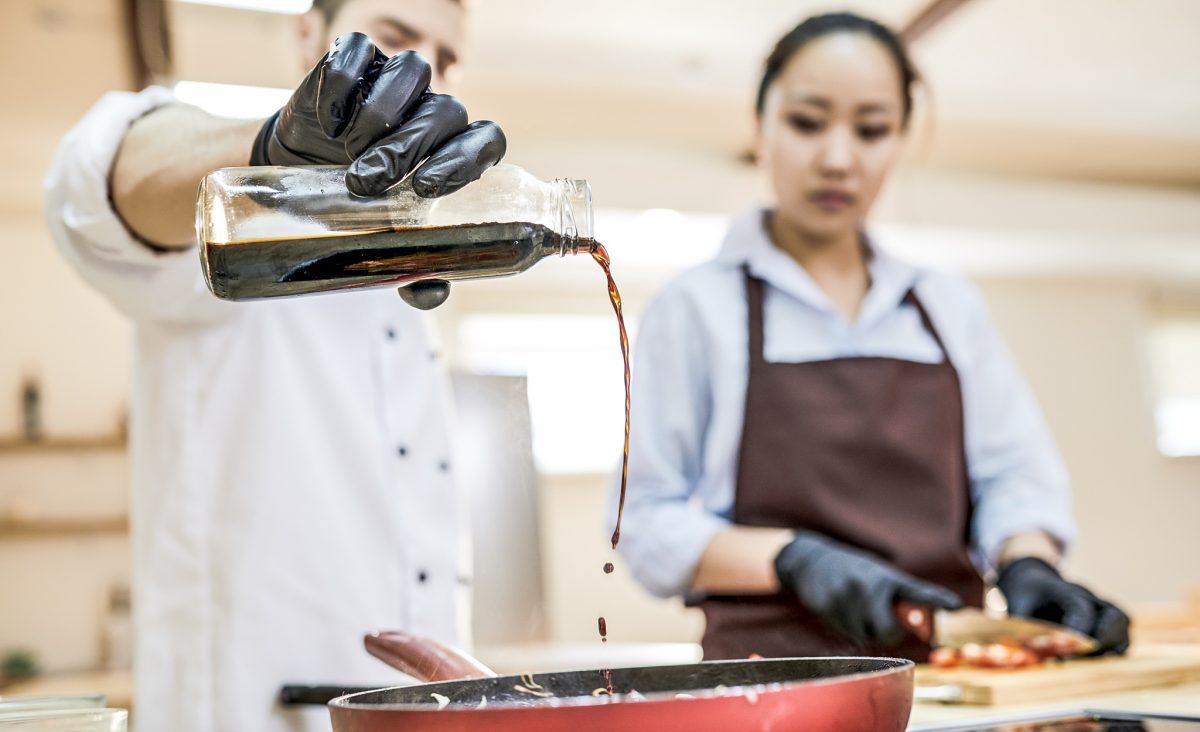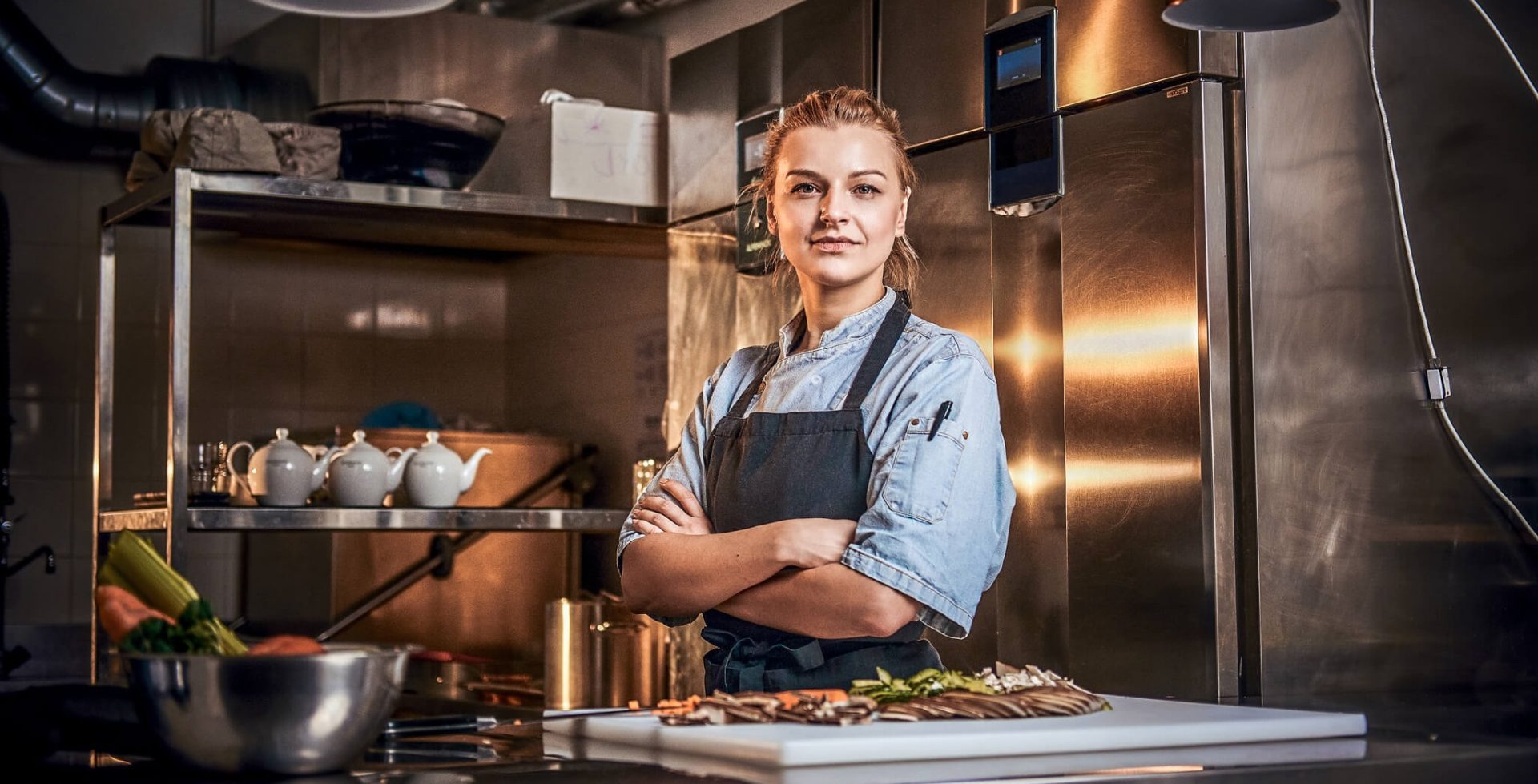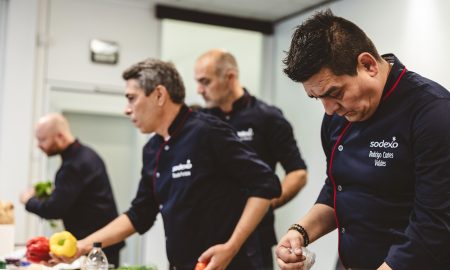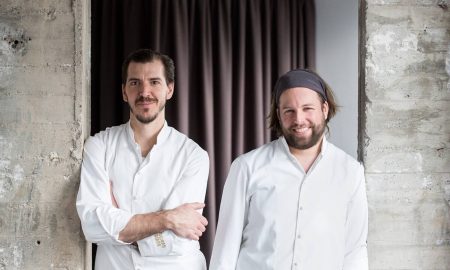It’s quite the paradox: As long as cooking equals unpaid work, men are more than happy to let women take lead. However, when it comes to securing a spot at the stove in a professional kitchen, female chefs have to “earn” it first. For example, the official website of the Maison Pic restaurant in Valence, France, run by Anne-Sophie Pic, says her career is “a testament to an extraordinary strength of character, since it took a great deal of conviction, perseverance and faith for her to assert herself as a self-taught woman in a decidedly male world.”
Sieh dir diesen Beitrag auf Instagram an
Anne-Sophie Pic, who comes from a true dynasty of restaurateurs, initially wanted nothing to do with the family business. She opted to study business administration instead. However, she changed her mind after earning her degree and decided to become a chef. She apprenticed with her brother, who took over the restaurant after their father’s sudden death. In 1997, she suddenly became head chef. Ten years later, the Michelin Guide awarded her a third star, the first French woman to receive one in 56 years. To date, Anne-Sophie Pic is the only woman among France’s 39 three-star chefs.
Subtle traces become broader tracks
Men continue to dominate professional kitchens, and not only in France. In the USA, for example, Dominique Crenn is the only female top chef who has been awarded three Michelin stars. Nevertheless, a growing number of women are asserting themselves in the food business, according to renowned food trend researcher Hanni Rützler. She first mentioned the trend “female connoisseurs” in her 2018 Food Report, where she described how women are conquering areas that were previously characterized by patriarchal structures – such as gastronomy.
This trend is still continuing in 2024, as Rützler reports, “the subtle traces of the gender shift in the food and beverage industry have expanded into increasingly broader tracks, even though declining movements in emancipation can be felt in other social areas.”

Image: Julietta-Kunkel
Female connoisseurs think ahead
But how is female influence affecting the food service industry? And what makes female connoisseurs different from their male colleagues? “I looked at where women have become more visible and identified some best practices. In doing so, it became clear that they work more as a team and are focusing more on sustainability, the future and health,” explains the nutritionist. As an example, she cites Parvin Razavi, who was named Austria’s 2023 Newcomer of the Year by Gault&Millau, among other female chefs and founders.
Born in Iran, she mainly serves vegan and vegetarian dishes at her restaurant &flora in Vienna. She makes it a point to make use of everything plants have to offer to enhance the taste experience as well as reduce waste in her kitchen. The fact that most of her team is made up of women “may gladly be interpreted as a clear statement in the gastronomy scene,” she says. With a four-day week and three days off at a stretch, it also provides better working conditions than people in gastronomy are used to.

Image: Seventyfour
In other parts of the world, women are also becoming increasingly influential figures in the industry – such as Elena Reygadas in Mexico. Named “Latin America’s Best Female Chef” (2014) and “World’s Best Female Chef” (2023), the formidable chef has launched a scholarship program in Mexico that is specifically targeted to women. The major goal is to strengthen equal opportunities for women in the gastronomy industry and to reinforce their leadership role. The “Beca Elena Reygadas” program is open to all Mexican female students.
Female connoisseurs – founders shake up the start-up scene
The trend is even more noticeable in other areas of the industry. Women are particularly well represented in the food blogger scene, as well as in dietetics and oecotrophologie (the study of household and nutritional sciences). A growing number of women are also founding innovative food service start-ups. The focus is usually on the topic of sustainability. “In some cases, female connoisseurs are young mothers,” explains Hanni Rützler. “This changes the way you look at the world. I don’t want to reinforce gender bias by saying that, but it’s already shaking up the scene.”
Sieh dir diesen Beitrag auf Instagram an
Israeli Daphna Nissenbaum, for example, founded TIPA together with her colleague Tal Neuman, which develops and produces fully compostable packaging materials for food and clothing. The idea came about when one of Daphna Nissenbaum’s children lost a plastic water bottle she had given him for school, so he couldn’t reuse it. That’s when the entrepreneur decided to invent an alternative that was in no way inferior to conventional plastics in terms of elasticity and strength, but which was 100 percent biodegradable – similar to an orange or banana peel. A number of supermarkets in Europe are now using TIPA’s degradable plastic, and major clothing designers are also shipping their online goods using its innovative packaging.
Women are making a name for themselves in the plant-based food industry as well. In particular, the issues of sustainability and animal welfare motivated the two following entrepreneurs to explore alternative plant-based products. For example, career changer Christie Lagally, who used to work as an engineer at Boeing, founded the start-up Rebellyous Foods in the USA in 2017. Its mission: make plant-based meat affordable for everyone. With its patented technology, the company now produces plant-based “chicken” products. These products are not sold at horrendous prices; on the contrary, they cost the same as animal products, but produce less waste and consume less energy.
Sieh dir diesen Beitrag auf Instagram an
Another impressive entrepreneur is Crafty Counter founder, Hema Reddy. She has developed a plant-based hard-boiled egg made from water, almonds, cashews and coconut milk that is not only well received by consumers in the USA, but also very popular in the food service industry.
Cheers! Let’s toast to that!
However, it’s not just the food sector that is becoming increasingly female, but the beverage sector as well. More and more women are making a name for themselves as bartenders. In viticulture, emancipation has also been on the horizon for some time, as the trend researcher notes in her latest Food Report. The farms are increasingly being handed over to daughters, who then lead them in a forward-looking direction.
This is the case in regions such as Tokaj in Hungary, where there were hardly any women in viticulture two generations ago, as wine journalist Manfred Klimek wrote in an article for the German newspaper, Die Welt. Especially in this rural area, “where Machismo is still part of everyday life, these female winemakers are now first and foremost making wines which are more elegant and European, quieter and, above all, more enjoyable.”
What the women named here have accomplished is undoubtedly impressive. However, it goes without saying that this is only a small selection. There are so many more female connoisseurs who should be ushered into the spotlight because they are paving the way for a more sustainable and diverse future for the industry, and hopefully motivating others to rise to the challenges of our time.















